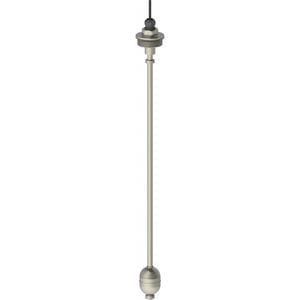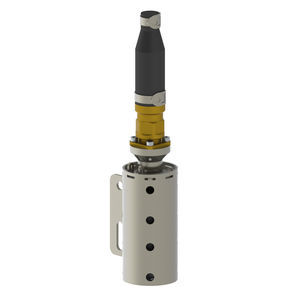

- Company
- Products
- Catalogs
- News & Trends
- Exhibitions
Magnetic float level switch LS-240Efor liquidsfor tankfor chemicals
Add to favorites
Compare this product
Characteristics
- Technology
- magnetic float
- Medium
- for liquids
- Applications
- for tank, for chemicals, for marine applications, bilge
- Material
- stainless steel
- Mounting
- vertical, flange, side-mount
- Other characteristics
- multi-point, single-point
- Process temperature
Max.: 80 °C
(176 °F)Min.: -20 °C
(-4 °F)- Process pressure
10 bar
(145.04 psi)
Description
Float switch for a secure, selective level measurement
Through their design and the selection of materials, the float switches are specially developed for use in shipbuilding or in rough environments.
Low dimensions and shock resistances up to 400 g are basic requirements for use for bilge monitoring in ships and particularly in submarines.
Versions with one or two switching points are available that can be monitored redundantly or that serve to detect cable breaks. With an angular or flange attachment, an installation option will be found even on the smallest integration space. Whether versions with a directly connected cable or with a connector are chosen is a question of installation friendliness; additionally, the connector version is water-tight up to 50 bar (5 MPa), even when unconnected.
All the float switches are amagnetic due to the selection of materials and the design. In a special feature for applications in military shipbuilding, the magnets in the floats are arranged in such a way that an extremely small magnetic stray field is produced.
WEKA offers maximum reliability in selective level recording!
Catalogs
No catalogs are available for this product.
See all of WEKA‘s catalogsRelated Searches
- Level limit switch
- Liquid level limit switch
- Float level switch
- Level transmitter
- Stainless steel level limit switch
- Liquid level transmitter
- Liquids level indicator
- Tank level detector
- Magnetic float level switch
- Vessel level transmitter
- Vertical level detector
- Visual level indicator
- Flange level limit switch
- Electronic level indicator
- Tank level indicator
- Chemical level limit switch
- Multi-point level switch
- Side-mount level switch
- Level transmitter for industrial applications
- Stainless steel level indicator
*Prices are pre-tax. They exclude delivery charges and customs duties and do not include additional charges for installation or activation options. Prices are indicative only and may vary by country, with changes to the cost of raw materials and exchange rates.



